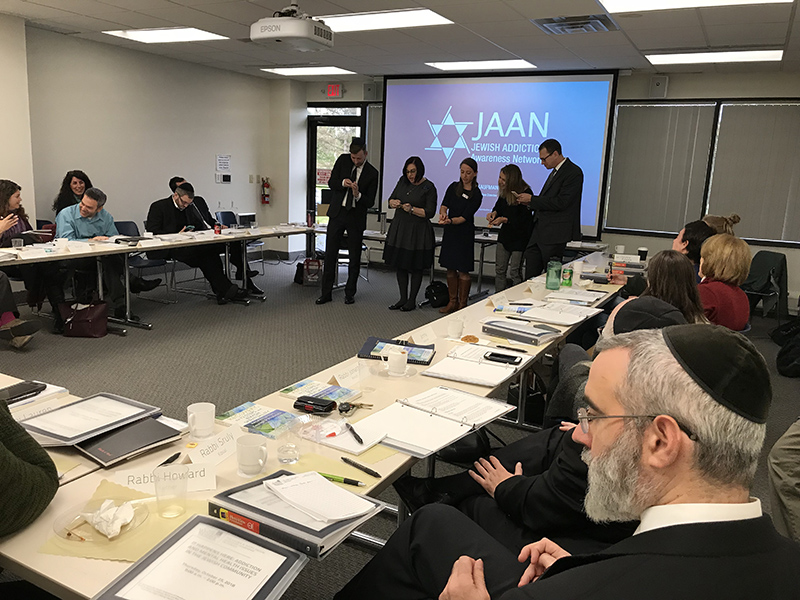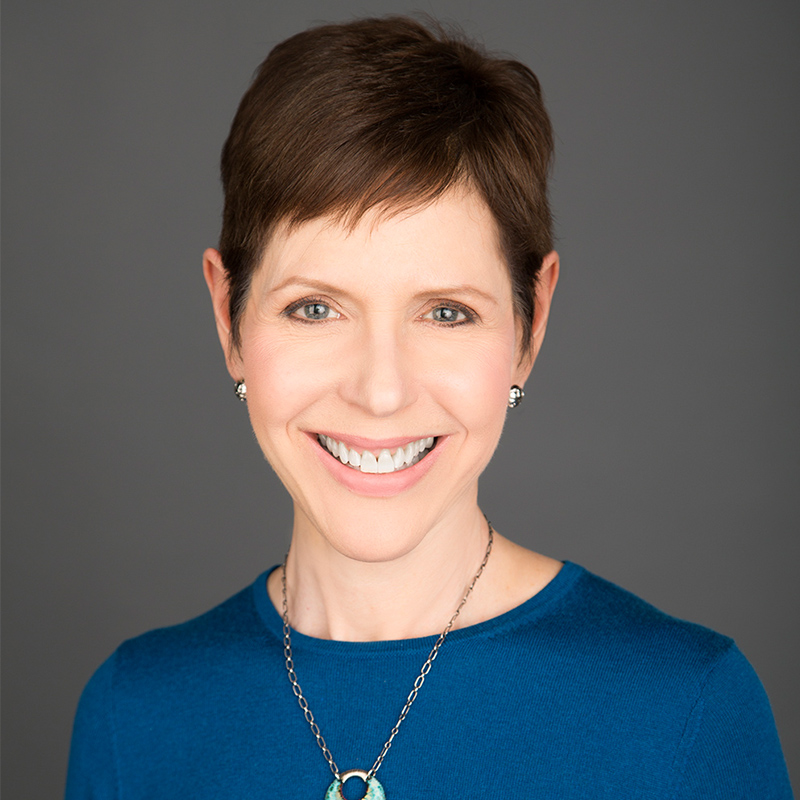Marla Kaufman’s elder son is doing well these days, healthy and happy and working in his field.
But her son has walked a long and painful path to recovery from addiction, starting in the summer of 2006 at age 16. That’s when Kaufman and her husband, Joe, learned their son was “using substances in a dangerous way,” she said.
Their son had just returned to their home in Orange County, California, from a group trip to Israel when they learned of his addiction.
“We were shocked and we were naïve and didn’t think that this could happen to, quote, nice Jewish families,” she said.
They talked to their rabbi, who was supportive “beh ind closed doors,” but they ultimately sent their son out of state for treatment. They were leaders in their Jewish community. People asked where their son was. Word got around quickly.
“We felt we were looked upon differently,” Kaufman said. “There was just an instant stigma that came with this with a lot of people (though) not everybody.”
After walking her own path for 10 years trying to find help for her son, Kaufman founded the Jewish Addiction Awareness Network (JAAN) in 2016 and is its executive director. In 2019, she and her husband moved from Orange County to Seattle, where JAAN is based.
Kaufman will be a panelist on a Zoom event July 18 titled “Destruction to Redemption: Personal Stories of Addiction and Recovery” as part of this year’s local Tisha B’Av observances. Several people from the Kansas City area and elsewhere will share stories of their struggles with addiction or those of loved ones.
The Rabbinical Association of Greater Kansas City and Jewish Family Services of Greater Kansas City are presenting the program.
Tisha B’Av starts this year at sunset July 17. It commemorates the destruction of Jerusalem’s first and second temples, in 586 B.C.E. and 70 C.E., respectively. It also marks other disasters and tragedies Jewish people have experienced throughout history.
It is observed on the 9th day of the Hebrew month Av, a time of fasting, lamentation and prayer. It is customary on Tisha B’Av to fast and refrain from bathing, wearing leather shoes and having sexual relations, according to chabad.org.
Congregation Beth Shalom, 14200 Lamar Ave. in Overland Park, will host a communitywide Tisha B’Av observance July 17 on Zoom and with limited in-person attendance. A ma’ariv service starts at 9:30 p.m., followed by a D’var Torah and reading of Eicha.
Kehilath Israel Rabbi Moshe Grussgott is the July 18 Zoom event’s rabbinic liaison and helped organize the event along with Rabbi Jonathan Rudnick, community chaplain of Jewish Family Services and communitywide rabbinic liaison for this year’s Tisha B’Av observances, who will attend the Zoom event.

Rabbi Grussgott called Tisha B’Av “the saddest day of the Jewish year.” The program on the second day of Tisha B’Av every year is related to sadness or tragedy and redemption.
“We believe that when the messiah comes and when the world is at peace, Tisha B’Av will become a holiday, a joyous day,” he said. “Toward the end of the second day, we start looking forward to that sense of hope. … The idea is we want to go from destruction to redemption. Addiction is a personal form of destruction that hopefully can be followed by a kind of redemption, which is recovery.”
Sarah Link Ferguson, development officer at Kansas City-based First Call, will moderate the panel at the July 18 Zoom event. First Call is a nonprofit organization founded in 1958 that provides services to reduce the effects of alcohol, drugs and addiction.
Ferguson lives in Overland Park and is a member of Congregation Kol Ami. She became sober in December 2018.
She wants to have a conversation about substance abuse and recovery in the Jewish community “because it’s not something that I see talked about a lot.”
“I’m just speaking personally, not as a professional in the field,” she said. “But personally, as a Jewish person in recovery, I don’t see a ton of discussion about this issue.”
Kaufman found the same lack of discussion about addiction and recovery in her Jewish community in Orange County as she began looking for help for her son. She was sent to family 12-step support meetings that were all in churches, not in synagogues “or any Jewish spaces at all,” she said.
That lack of support in her Jewish community hit Kaufman hard. She and her husband didn’t renew their synagogue membership, became unaffiliated for four years and “retreated from the community, which for me especially was like salt on the wound,” she said.
“My Jewish community has always been the place and my Judaism has always been the place where I’ve gone when I need to enhance my celebrations and joys in life and also when I want to have support for the not so pleasant times in life,” she said. “And here, the biggest challenge of our family life, and I felt like there was not only nothing for us but kind of a rejection on certain fronts.”
With the help of a rabbi who understood her plight, she gradually became involved again in Judaism. And eight years after she learned of her son’s addiction, she discovered a book that “really changed my life” — “Recovery, the 12 Steps and Jewish Spirituality: Reclaiming Hope, Courage & Wholeness” by Rabbi Paul Steinberg, who is an alcoholic in recovery.
“He named what I experienced for eight years,” she said.
This included ignorance and denial in the Jewish community about alcoholism and addiction, few Jewish institutions serving addicts and rabbis rarely speaking from the pulpit about the problem “even though we know there are a lot of families touched by it and struggling.”
Kaufman recited some quotes from Steinberg’s book that especially affected her: “What I know for myself now is I will not contribute to Jewish ignorance about my disease,” and “My Judaism is not separate from my addiction and recovery but integrated into it.”
Kaufman started conducting educational workshops about addiction and recovery in Orange County’s Jewish community and later took the workshops to eight other Jewish communities around the country, all of them emphasizing the ongoing nature of the problem and the ongoing need to address it.
“I think the Jewish community is getting out of the denial by and large,” she said.
The July 18 Zoom event demonstrates that “people can speak openly about addiction and recovery,” Rabbi Grussgott said.
“It wasn’t so long ago that there was, wrongly, a sense of shame and stigma around this,” he said. “And it could really inspire people to see it’s not something to be ashamed of and keep in secret, but it should come out of the shadows.”
KC-area Tisha B’Av observances July 17-18
The Kansas City-area Jewish community will gather July 17 and July 18 in observance of Tisha B’Av.
Tisha B’Av is observed on the 9th day of the Hebrew month of Av, a time of fasting, lamentation and prayer to remember the destruction of the First and Second Temples of Jerusalem and other disasters and tragedies Jewish people experienced throughout history.
“Tisha B’Av commemorates destruction, but also bears with it the hope of redemption,” according to the Rabbinical Association of Greater Kansas City.
July 17:
Congregation Beth Shalom, 14200 Lamar Ave. in Overland Park, will host a communitywide Tisha B’Av observance offered on Zoom and with limited in-person attendance. A ma’ariv service starts at 9:30 p.m., followed by a D’var Torah and reading of Eicha. Attendees can choose to participate in a reading in Hebrew or English from the Book of Lamentations that describes Jerusalem’s destruction through song and poems. Register online at bit.ly/3A7L2OM.
Saturday, July 18:
A Tisha B’Av observance program titled “Destruction to Redemption: Personal Stories of Addiction and Recovery” starts at 4 p.m. on Zoom. Several people from the Kansas City area and elsewhere will share stories of their struggles with addiction or those of loved ones. The program is jointly presented by the Rabbinical Association and Jewish Family Services of Greater Kansas City. Register online at bit.ly/2U8z476.
Program panelists:
- Solomon Alpert grew up in the Kansas City area, attended Congregation Beth Torah synagogue for most of his childhood, became a bar mitzvah there and lives in Midtown Kansas City. Alpert struggled with alcohol and drug use from 2005 until he started regularly attending Alcoholics Anonymous meetings in late 2016.
- Mira Cohen is a recording artist and social media branding specialist who works for Jewish Family and Career Services of Atlanta. Cohen has been in addiction recovery since 2013 and uses her experience and art to help others recovering from addiction.
- Rabbi David M. Glickman of Congregation Beth Shalom will share the story of his brother’s struggles with addiction.
- Marla Kaufman is executive director and founder of the Seattle-based Jewish Addiction Awareness Network (jaanetwork.org). Kaufman and her family sought resources for more than 10 years to help her son with recovery from addiction. She founded JAAN in 2016.
Program moderator:
- Sarah Link Ferguson is the development officer at Kansas City-based First Call, a nonprofit organization that works to reduce the effects of alcohol, drugs and addiction by providing resources to individuals, families and the community at large. She is a member of the recovery community and belongs to Congregation Kol Ami.
Rabbi Jonathan Rudnick is the rabbinic liaison for this year’s communitywide Tisha B’Av observances. Rabbi Moshe Grussgott is the Sunday program rabbinic liaison.
For more information, visit kcrabbi.org or contact Annette Fish, Rabbinical Association administrator and program director, at or 913-327-8226.




